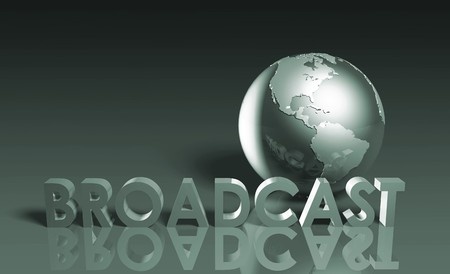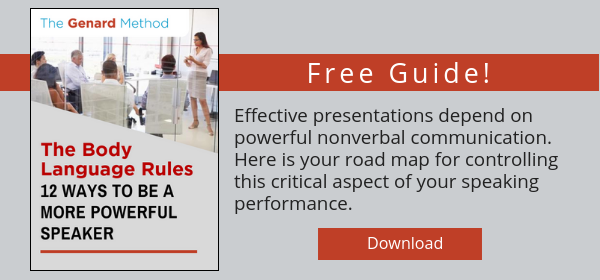
Body language makes you interesting, but it can also boost your confidence! Here's why looking poised and professional can improve your self-image.
Want to use your body more effectively?
Whether you turn heads at the beach or consider yourself a modest physical specimen, your body is one of your most effective presentation tools. Yet chances are you’re not using this marvelous instrument to both feel and broadcast confidence.
Body language not only affects how people perceive you. It has a lot to do with how you feel about yourself! For must-know secrets to using body language effectively, download my free cheat sheet, "5 Secrets of Powerful Body Language."
Why Nonverbal Communication Matters in Public Speaking
You may already know that nonverbal communication is vital to effective public speaking. But have you ever thought about what this really means apart from gestures and body positions? The reality is, there’s much more going on than that.
Consider the following aspects of speaking publicly that depend partly or wholly on physical expression:
- Composure
- Intention
- Self-confidence
- Self-control
- Emotional response
- Leadership abilities
- Experience
- Familiarity with presentation tools (flip charts, PowerPoint screens, lecterns, etc.)
- Comfort with one’s material
- Vocal projection and power
- Eye contact
- Balance
- Nervousness
- Muscular tension vs. relaxation
- Extroversion vs. introversion
- Trustworthiness
- Vigor
- Fitness
- Flexibility
- Friendliness
- Openness or lack thereof
- Command of the room

Are You Missing Out on Stage Presence?
If you need a reminder of how important body language is to public speaking, consider this: Every one of the attributes listed above is something that audiences can perceive about you just from what you demonstrate physically! So at the least, you should know how to avoid the 5 body language errors that will sink your presentation.
Your physical approach to public speaking is completely on display at all times. Moment by moment, it’s giving audience members important clues concerning who you are and what you represent. It’s also alerting them to your feelings about yourself, which helps determine how they feel about you.
Why, then, do so many public speakers provide audiences with a version of themselves that's ineffective at best? You should be hyper-aware instead of the self-image you're broadcasting through your body language.

The Truth About Body Language in Popular Culture
Let’s look for a moment at how body language is portrayed in popular culture.
Books on body language are reliable sellers. And they’ve certainly raised the awareness of nonverbal communication among the general public. At the same time, though, they’ve served up some pretty sketchy information in terms of the way people communicate.
For one thing, books and articles in this area tend to focus on reading people’s behavior in social situations rather than public speaking. And the “rules” set forth tend to be rigid. Have you learned the following, for instance?
- Crossed arms means resistance.
- A woman tucking her hair behind her ears is giving positive sexual signals.
- A glance to the speaker’s right while answering a question signals lying.
And so on.
Yet one-shot physical responses like these mean little or nothing. Professionals whose job it is to rigorously read body language—customs officials, police interrogators, cross-examining attorneys, and so on—know that what matters more is a change in the pattern of behavior. In other words, when gestures, vocal quality, or the rhythm of answers suddenly differ from what’s come before, a red flag is raised. The questioner then knows to probe a little more deeply into whatever was being discussed when the new pattern of behavior revealed itself.
It’s the same with public speaking: The way you use your body establishes a baseline of your physical persona, i.e., a pattern of the nonverbal messages you broadcast to audiences. Change something in that mix, and what you’re showing listeners no longer matches your verbal content. Your presentation is no longer a unified and believable whole. There are even key body language mistakes that will destroy your own message you should know about!
That’s why establishing a straightforward, natural, and confident persona physically will get you off to a strong and consistent start. Your body should support what you’re saying and provide a visual expression of that content, not work in the opposite direction. Naturally, the more aware and comfortable you are with the physical aspects of speech performance, the more likely it is that such an effect will occur.

Broadcasting Confidence in Public Speaking
All of which is to say, you need to “broadcast” confidence when you speak in public.
Do you find that difficult because you experience anxiety over public speaking? If that's the case, chances are you have difficulty using body language effectively. Overwhelming feelings of self-consciousness, for example, can make you stiffen up. And you're likely to use gestures that are tentative or too formal.
Extreme nervousness can even make you stand statue-like, as though a chasm surrounds your two square feet of stage and one step in the wrong direction means oblivion. Here, for instance, are ways you may be reducing your effectiveness just by how you stand at a podium.
But let’s look at what happens when you “broadcast confidence” through effective body language:
- You come across as credible and knowledgeable, someone who enjoys public speaking.
- Your voice amplifies this effect, since vocal production is also a physical process.
- You seem more comfortable in your skin.
- You appear confident enough to speak to even large audiences without any sign of nerves.
- You become more likable and therefore more persuasive.
Not a bad set of advantages from what really comes down to looking the part! And here's some really good news if you suffer from speech anxiety: "broadcasting" confidence even if you don't feel it will help your audience think you're confident and respond accordingly.
Stand tall, stride to the front of the room or lectern, keep your shoulders back so your chest is "open" rather than closed, use a good stance with your feet slightly apart, and look your listeners in the eye. You'll be sending out the right set of signals to increase your audience's faith in you, which will send you a jolt of confidence. Achieve these physical externals of public speaking, and you’ll look like you’re having a ball, even if speech anxiety is on your dance card.
This blog was originally published in 2012. It is updated from time to time.


